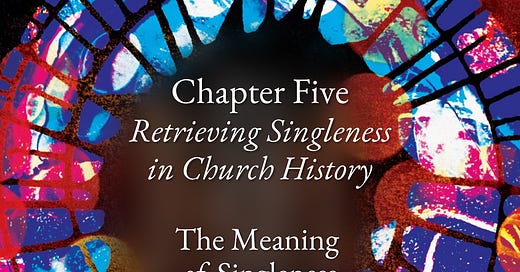My upcoming book, The Meaning of Singleness, will be published by InterVarsity Press on May 9, 2023. In the lead up to its release, I’m sharing a short weekly excerpt, chapter by chapter.
You can pre-order or see more information about the book (including its full contents page, endorsements & a free sample chapter) here.
LIMITED TIME OFFER TILL MARCH 31: Use this code at checkout - WHM23 - to receive a 30% discount and free shipping in the US.
Chapter Five: Retrieving Singleness in Church History
“While marriage itself was generally seen to remain an important and even necessary societal good [within the Early Church], the place of sex within marriage was a matter of far greater Christian contestation. Some spouses committed to total sexual abstinence. Others engaged in sexual intercourse for the specific purpose of procreation only (meaning that a husband and wife might sleep with each other only very rarely, in-between seasons of pregnancy). Many others ceased sexual relations altogether once the time for childbearing was past.
Such degrees and forms of Christian sexual chastity in marriage were determined by the sense in which marriage, or more specifically sex was understood to serve God’s purposes. On one hand, married Christians perceived a responsibility for their sexual conduct to stand in contrast to any pagan notions of sexual self-indulgence. Such extravagance was seen to have little place within the orderly and disciplined Christian life, as exemplified in Clement of Alexandria’s exhortation that married Christians not “put off modesty at the same time that you put off your clothes; because it is never right for the just man to divest himself of continence.”1
However, marital abstinence was also, and somewhat paradoxically, enacted in response to the anticipated eschatological—and even apocalyptic—disruption of the present social order. That is, though marriage was generally still considered to be the institution by which social stability and security might be ensured, not all early Christians took that to mean they had a duty to enthusiastically embrace it without qualification or hesitation. In particular, while ancient believers generally perceived marriage and procreation (and therefore, also sex) to be vitally significant within the present order, they wrestled with the sense in which participation in those things only served to actively and indefinitely perpetuate that same present order. Such an outcome did not sit comfortably with those whose eyes were fixed on the eschatological horizon.
In this light, virginity began to take on great theological significance as that which declined to facilitate a seemingly endless cycle of birth, life, and death within this present, fallen creation. By the middle of the second century, the Christian “continent body stood for a principle of reversibility; the flow of life itself could be halted . . . the means by which society was continued could be abandoned. Chastity announced the imminent approach of a ‘new creation.’”2 So it was that church fathers of the second and early third centuries were left in the position of needing to grapple with the celebration of sexual continence as a biblical ideal, while simultaneously upholding the honor of marriage as a key scriptural teaching and societal good.”
Taken from The Meaning of Singleness by Danielle Treweek. Copyright © 2023 by Danielle Elizabeth Treweek. Published by InterVarsity Press, Downers Grove, IL. www.ivpress.com.
I’m committed to keeping all the content I publish here FREE. I won’t ever charge for it. However, I rely on the generous financial support of people who value my writing and ministry to allow me to keep doing it.
If you would like to financially support my ministry, you can make a one-off or regular gift by clicking on the image link below.
Clement of Alexandria, “The Instructor,” in Ante-Nicene Fathers: Fathers of the Second Century: Hermes, Tatian, Athenagoras, Theophilus, and Clement of Alexandria, ed. Alexander Roberts and James Donaldson (Peabody, MA: Christian Literature Publishing Co., 1885), 263.
Peter Brown, The Body and Society: Men, Women, and Sexual Renunciation in Early Christianity, Twentieth-Anniversay Edition ed. (New York: Columbia University Press, 2008), 64.





